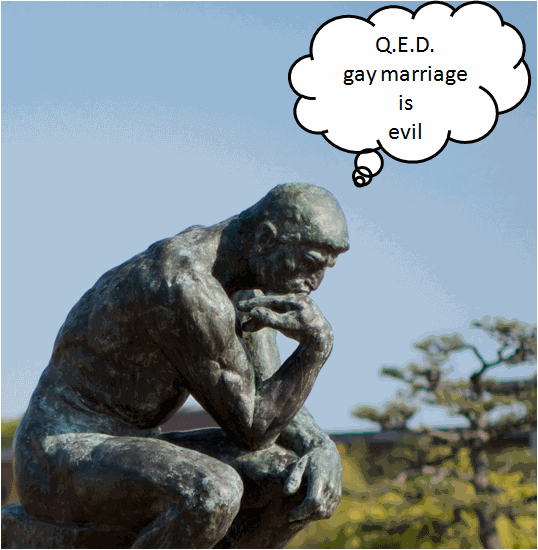Some recent events got me thinking about the troubles with the idea of being reasonable. Of course, I’m all for the practice of reason. The problem is using it as a label in argument, especially when it’s done with rhetorical flourish.
A great background post to this is Crommunist’s excellent post on using the label of “skeptic” or “ally” in an argument. The main point being is that it’s our actual behaviour that gives you those particular labels, not saying “I’m X”. The moment we start using the label, there’s a strong danger of it being a rhetorical trick — namely that we might be covering up (consciously or not) the fact that our behaviour does not fit the label.
And then there’s the whole boy who cried wolf thing. Ahamefule Oluo has a good bit of standup about how the fact that people feel the need to say we’re living in a ‘post-racial society’ proves that we’re not in a post-racial society. (His example is that nobody feels the need to say we live in a ‘post-dinosaur society’.) Not to find Game of Thrones references for everything, but Tywin Lannister did have a point here:

The specific label of reason itself has some extra problems when thrown around in conversation. Firstly, the concept of reason has often been used to marginalise particular kinds of people as irrational, often as an excuse to colonise, murder, rob, rape and sterilise them. Because reason is an attractive mantle to be wearing, it can come in handy when we’re doing something dodgy. Of course it doesn’t mean that most criticism of people as unreasonable is like that but it’s important to be aware of.
The second, more pertinent problem, is that the label of reasonable can often has two separate meanings in argument:
- Following specific modes of thinking that will give us the most accurate picture of the world possible (compared to other modes of thinking)
- Following common sense and that good-old “folksy” feeling we get
This is what bugs me the most about the reason label — it’s someone arguing #2 but using the implied assumption that they’re engaging in #1. What got me onto this is how many fucking times anti-gay bigots get to frame the discussion as something like this (not a real quote):
Look, nobody thinks that gay or lesbian people should be oppressed in any way. But surely reasonable people of goodwill can disagree on the matter of what constitutes marriage civilly, without resorting to playing the homophobia card and without trying to impose their will on others through legal means. Look, you have your views and I have mine and we’ll just reasonably go through the logical arguments and if you’re reasonable we won’t let that affect how we see each other [while your rights are being shat on].
I need a shower after typing that but it’s the tactic of all sorts of bigots. It goes way beyond the more obvious bigotry however. Here’s the portrait of the reasonable man (I use the gendered pronoun for a reason) that I’ve gleaned from people’s use of the rhetoric in other areas. His views follow the golden mean. He is neither too far to one end or the other on a given topic. And he sets himself up in opposition to the two “extreme” positions which must be wrong (hence my favourite XKCD comic below):

He gets to set this middle ground and what counts as “reasonable” disagreement. You can disagree a little to this way and a little to that way and it’s meant to be debate. Coke or Pepsi, sir? He therefore gets to employ the same kind of false balance in his personal/political/religious/philosophical views as the media when they engage in false balance:
- He’s a “moderate”.
- He opposes animal cruelty and hunting — but he’s not an extremist like a vegetarian or vegan.
- He opposes racial discrimination in law — but he’s not “one of those” people who make it all about race. He strives to be colourblind.
- He believes women should have equal rights — but geez those activists sure do get angry!
- He may [optimistically] oppose violence against trans people — but he probably doesn’t think that trans men and women are “really” men and women respectively.
- He’s not particularly religious — but those atheists are just as strident as the fundamentalists! (Again, thankyou XKCD.)
- He gets upset at news reports of massive world poverty, hunger and disease — but is worried about all that money being wasted on “propping up third world dictators”; and by the way things are a bit tight for us at home, can we really spare this right now?
- etc etc
Ok, I’m guilty of stacking the deck. From how I’ve described these positions, you can guess how “reasonable” I find them. But still, someone with all those views can and will be called moderate and reasonable in a very large number of social situations. In other words, the power of the folksy common sense positions is to set themselves up as the default. Then they can be considered reasonable because anything more radical will be seen as a deviation from the default.
This should raise some red flags. If you wanna go all reasonable, status quo bias is an actual thing. But more importantly, the mantle of reason itself should be a massive red flag. When are we using it just to marginalise and when are we using it to do the heavy lifting for status-quo arguments that are unreasonable, illogical and inhumane?





0 Comments